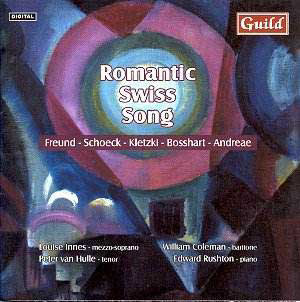 Composer: Robert Freund, Othmar Schoeck, Paul Kletzki, Robert Bosshart, Volkmar Andreae
Composer: Robert Freund, Othmar Schoeck, Paul Kletzki, Robert Bosshart, Volkmar Andreae
Works: Five Songs Op. 4 by Robert Freund; Das Fraulein am Meer, Perlen, Gefunden, Vergangenheit, Stummer Abschied, Lebewohl!, Volkslied, Kinderliedchen, Schlaf’ ein, lieb Kind by Othmar Schoeck; Four Songs Op. 2 and Night Songs Op. 3 by Paul Kletzki; Bitte, Ewige Sehnsucht by Robert Bosshart; Mond am Tage Op. 12 No. 1, Der Schmied Op. 12 No. 3, Requiem Op. 10 No. 1, Alte Schweizer Op. 12 No. 2 by Volkmar Andreae
Performers: Louise Innes (mezzo-soprano), Peter Van Hulle (tenor), William Coleman (baritone), Edward Rushton (piano)
Recording: St Paul’s School, London, 13-15 April 2001, DDD
Label: Guild GMCD 7237
The collection of songs presented here is a significant exploration of the Swiss lieder tradition, featuring composers who have often been overshadowed by their more celebrated contemporaries. Robert Freund, Othmar Schoeck, Paul Kletzki, Robert Bosshart, and Volkmar Andreae offer a rich tapestry woven from the threads of German Romanticism, suffused with themes of longing, nature, and existential introspection. This album, recorded in the UK yet steeped in Swiss literary and musical culture, showcases the emotional depth and lyrical beauty characteristic of this unique oeuvre.
Louise Innes, Peter Van Hulle, and William Coleman deliver an engaging performance, skillfully navigating the emotional landscapes of these songs. In Freund’s Five Songs Op. 4, Innes’s baritone emerges with a compelling gravitas, particularly in the dark, brooding atmosphere of “Der schwere Abend,” where the piano’s somber chords mirror the weight of the text. Van Hulle’s tenor, while at times faltering in expression, finds his footing in the lighter textures of “Viel Vögel,” where the delicate interplay between voice and piano creates a playful, almost pastoral charm. Coleman’s baritone resonates deeply in the poignant “Frage nicht,” where he captures the song’s existential lament with a sense of profound introspection.
Schoeck’s contributions are marked by a lyrical economy that speaks volumes in their brevity. The three songs sung by Van Hulle are commendable for their clarity and intent, though the tenor’s German accent occasionally detracts from the authenticity of the performance. Innes shines in “Schlaf’ ein, lieb Kind,” her voice a warm cradle for the lullaby’s tender sentiments, epitomizing the charm and innocence of childhood. The richness of her tone in this lullaby exemplifies her interpretive capabilities, marking it as a highlight of the disc.
Kletzki’s songs, particularly “Nacht für Nacht,” offer a stark contrast, veering towards expressionism. Here, Innes’s voice rises triumphantly to an emotional climax, echoing the influences of Rachmaninov and Sibelius. The technical execution is commendable, yet it is the emotional connectivity of her performance that truly captivates. The recording quality supports these nuances well, with each voice and the piano blending into a cohesive sound picture that allows the subtleties of the score to shine through.
The engineering captures the intimate essence of the performance without compromising clarity. The piano, played by Edward Rushton, provides a nuanced backdrop that complements the vocal lines without overshadowing them. The recording avoids the pitfalls of excessive reverberation, favoring a close, warm sound that enhances the intimacy of the songs. Each phrase emerges with clarity, allowing the listener to appreciate the intricate interplay between the text and its musical setting.
This collection stands as a compelling introduction to a largely unexplored repertoire for those drawn to the melancholic waters of the German romantics. The interplay of musicality and text across the works of Freund, Schoeck, Kletzki, Bosshart, and Andreae presents a rich canvas of emotional expression and technical skill. For aficionados of lieder, this album is not merely a curiosity but an essential addition to the collection, revealing the depth of feeling that these Swiss composers have to offer. The performances, while occasionally varied in strength, generally illuminate the poignant beauty of these songs, encouraging listeners to delve deeper into the nuances of Swiss lieder tradition.



